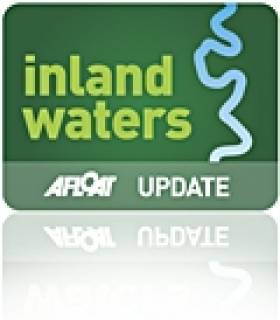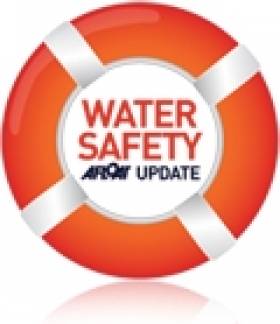Displaying items by tag: Portlaw
Clodiagh Expedition Leads to New Industrial Heritage Find
Four boats of the Heritage Boat Association, including Heritage Barges 68M and 72M, navigated the Clodiagh to Portlaw recently, the first time that barges have moored at the old Quay in 75 years.
They discovered the Portlaw Graving Docks at the Quay and based on the information in some of the historical documents at the Heritage Centre, these may date from as early as the 1820s and been built before the town. On the same site are the remains of a stone workshop and behind the cut stone quay, they found an old cobbled yard and track.
These structures are close to the old Lock Gate, whose design is reputed to be unique in the British Isles. The gate formed the entrance to the Portlaw Canal where raw materials were carried by barge into the Cotton Mill and the finished product was sent from here on the first stage of the journey to countries all over the world.
All concerned were excited about finding these structures which may pre-date the building of the town of Portlaw. Gerry Burke of the Heritage Boat Association stated "Finds like these are not only important to our boating heritage but give us insights into the social aspects of our ancestors and their amazing skills in creating innovative industrial artefacts by hand. It is important they are preserved for both their tourism value and for future generations to appreciate."
Brian Goggin, who writes about Irish Waterways' history, said "Portlaw's foundation as an industrial town is intimately linked with the use of the River Clodiagh, but there is little published information about the navigation or about how boats used it. These new discoveries add an extra dimension to our understanding and extend the boundaries of the area that should be conserved."
The Heritage Boat Association's aspiration is to protect, promote and celebrate the floating heritage on the inland waterways of Ireland. Our floating heritage provides us with a direct link to the past and includes both commercial and pleasure craft that plied the inland waterways.
Family Considers Legal Action Over Kayak Trip Victim
The Irish Independent reports that the family of a man who drowned with a friend on a kayaking trip are considering legal action over the lack of warning signs at the weir where they lost their lives.
Accident investigators have classed the weir at Portlaw on the Clodagh in north Waterford, where Philip Kelly (31) and Connie Smith (31) drowned, as "dangerous and unnavigable" for kayaks and canoes.
Investigators from the Marine Casualty Investigations Board also found that vital lifesaving equipment at the weir, which had been vandalised, was not replaced.
"We feel if signs had been in place that day, warning them how dangerous it was, they would be with us today," Kelly's brother Paddy told the Irish Independent. "We are discussing taking legal action."
The Irish Independent has more on the story HERE.

























































